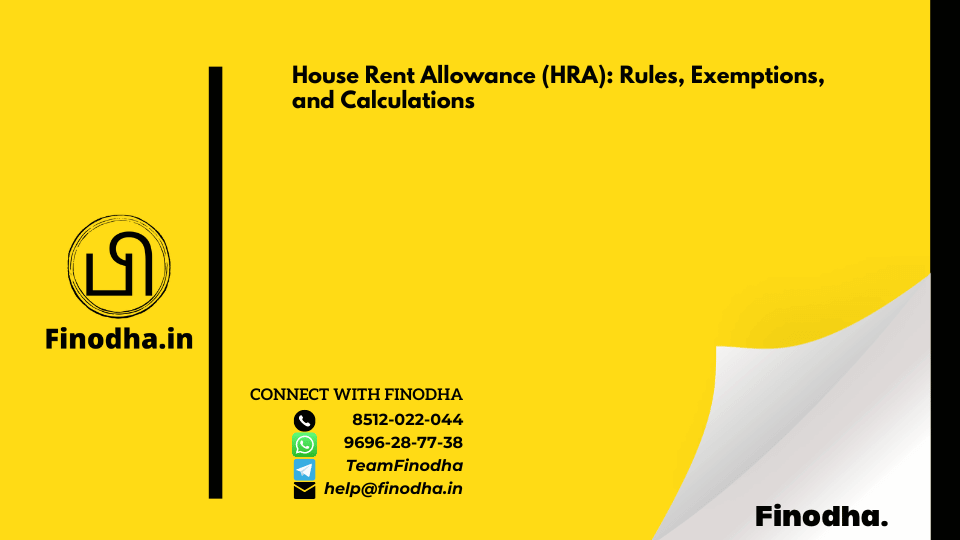Important Keyword: HRA, Salary Components, Salary Income.
Table of Contents
House Rent Allowance (HRA): Rules, Exemptions, and Calculations
As urbanization continues to rise, more individuals are migrating to cities in search of enhanced career prospects. This influx drives up the demand for housing, subsequently leading to an escalation in rental prices. These rent expenditures often pose a significant financial burden on individuals. To alleviate this strain, employers commonly offer House Rent Allowance (HRA) as a component of the employee’s salary package.
What is House Rent Allowance (HRA)?
House Rent Allowance (HRA) serves as a financial aid provided by employers to their employees, aiming to assist them in meeting their accommodation expenses. Salaried individuals residing in rented premises can avail of the House Rent Allowance exemption under Section 10(13A) of the Income Tax Act.
To claim this tax benefit, employees are required to furnish rent receipts to their employers. Subsequently, the employers compute the exempt House Rent Allowance and deduct it from the taxable salary of the employee. This exempted amount can be verified from the Form 16 provided by the employer.
From the financial year 2020-21 onwards, the House Rent Allowance Exemption is applicable only if the employee selects the Old Tax Regime.
Exemption rules and calculations:
The exempted HRA amount is determined by considering the least of the following:
- Actual House Rent Allowance received.
- Actual rent paid minus 10% of the salary.
- 50% of the salary in metro cities, and 40% in non-metro cities. (Salary includes Basic Salary + Dearness Allowance).
Let’s elucidate this with an example:
Suppose Raj is employed in a company in Ahmedabad and resides in a rented flat, paying a monthly rent of INR 20,000. Here’s his salary structure:
| Particulars | Amount (In INR) |
| Basic Salary | 5,00,000 |
| House Rent Allowance | 2,50,000 |
| LTA | 50,000 |
| Other Allowances | 20,000 |
| Gross Salary | 8,20,000 |
| Actual Rent Paid | 2,40,000 |
The least of the following will be the exempt House Rent Allowance:
To determine the taxable and tax-exempt House Rent Allowance (HRA), we need to calculate the three scenarios mentioned earlier:
- Actual House Rent Allowance received: INR 2,50,000
- Actual rent paid minus 10% of Basic Salary: INR 1,90,000 [INR 2,40,000 – 10%(INR 5,00,000)]
- 40% of the Basic Salary: INR 2,00,000 [40%(INR 5,00,000)]
The least of these three amounts will be the tax-exempt HRA.
In this case, the least amount is INR 1,90,000, which will be exempt from the total House Rent Allowance received. The remaining INR 60,000 (INR 2,50,000 – INR 1,90,000) will be taxable.
So, the taxable House Rent Allowance is INR 60,000 and the tax-exempt House Rent Allowance is INR 1,90,000.
Can a taxpayer claim both deductions on Home Loan & HRA?
Yes, a taxpayer can indeed claim both House Rent Allowance (HRA) and deductions on a Home Loan for interest and principal components, provided certain conditions are met.
| Case | Is the benefit for HRA and deduction on home loan available? |
| Living in a rented accommodation while having a home on loan in a different city. | Yes (Provided there is a distance of around 35km to 50km between two cities) |
| Living in a rented accommodation while having a home on loan in the same city. | Yes (Provided there is some genuine condition for example work place) |
| Acquired an under-construction property on loan and hence living in a different accommodation. | Yes (But the home loan interest can be claimed in five equal instalments only after the construction is completed) |
What if you don’t receive HRA?
Under Section 80GG of the Income Tax Act, individuals can claim a deduction for rent paid if they do not receive any House Rent Allowance (HRA) from their employer. To qualify for this deduction, certain conditions must be met:
- Payment of House Rent: The taxpayer must have paid rent for their accommodation.
- Absence of HRA Component: There should be no House Rent Allowance component in the taxpayer’s salary structure.
- Non-Ownership of Residential Accommodation: The taxpayer, their spouse, or minor children should not own residential accommodation at the place of employment.
- No Self-Occupied Residential Accommodation: The taxpayer should not own a self-occupied residential property at any other location.
If these conditions are met, the taxpayer can claim a deduction under Section 80GG. The deduction is the least of the following amounts:
- Rent paid minus 10% of the total income.
- INR 5,000 per month (INR 60,000 annually).
- 25% of the total income.
The total income here refers to the income after deducting all other deductions under Chapter VI-A, except for the deduction under Section 80GG.
It’s important to note that to claim this deduction, the taxpayer must file Form 10BA before filing their Income Tax Return. This form certifies that the conditions for claiming the deduction under Section 80GG are met.
Read More: LTA (Leave Travel Allowance): Meaning, Rules, Tax Exemptions and Conditions to claim
Web Stories: LTA (Leave Travel Allowance): Meaning, Rules, Tax Exemptions and Conditions to claim
Official Income Tax Return filing website: https://incometaxindia.gov.in/





0 Comments